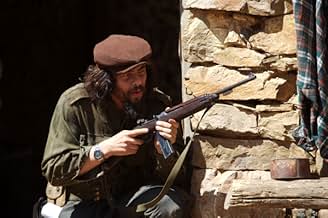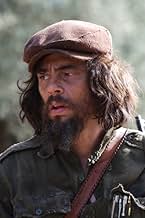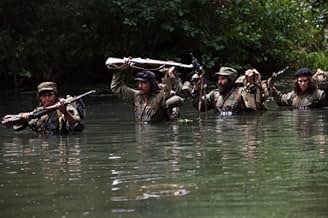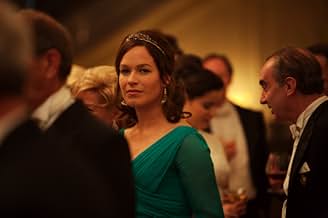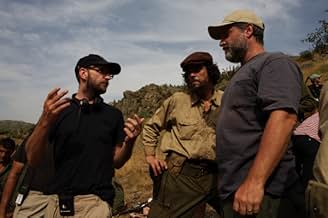In 1967, Ernesto 'Che' Guevara leads a small partisan army to fight an ill-fated revolutionary guerrilla war in Bolivia, South America.In 1967, Ernesto 'Che' Guevara leads a small partisan army to fight an ill-fated revolutionary guerrilla war in Bolivia, South America.In 1967, Ernesto 'Che' Guevara leads a small partisan army to fight an ill-fated revolutionary guerrilla war in Bolivia, South America.
- Director
- Writers
- Stars
- Awards
- 2 wins & 7 nominations total
Demián Bichir
- Fidel Castro
- (as Demian Bichir)
- Director
- Writers
- All cast & crew
- Production, box office & more at IMDbPro
6.836.1K
1
2
3
4
5
6
7
8
9
10
Featured reviews
Part two is a great standalone film, beautifully filmed, inspiring and tragic
I came to watch Guerrilla, part two of Steven Soderbergh's biopic of Che Guevara, without having seen the preceding film and without more than a cursory knowledge of Che's life. At the same time I was rather apprehensive that this would be both a heavy-going history lesson and an unrepentant love-letter to the iconic revolutionary. As it turns out, this film far exceeded my expectations.
Guerrilla works remarkably well as a standalone film. The story of Che's failed attempt to lead a revolution in Bolivia, then under military rule, is a compelling tragedy. The initial impetus brought by Che's arrival incognito to lead the guerrilla war is lost as misfortune follows misfortune. The odds stack up against the revolutionaries. US backing for the Bolivian army, hostile conditions in the rainforest, suspicious locals and Che's failing health are just some of the difficulties which beset the nascent rebellion.
Soderbergh's portrayal of Che is largely uncritical, but this film is no hagiography. The style is refreshingly undramatic, with a subtle and effective soundtrack by Alberto Iglesias adding quiet drama to many scenes. Che is undoubtedly the centre of the film but there are very few close-ups of his face and we are encouraged to see the people fighting alongside him and sometimes against him too. Where Soderbergh wishes to demonstrate Che's virtues we see it in small episodes such as the loyal acolyte who upbraids two fellow guerrillas when they question Che's leadership, and emphasises the sacrifice that he has made in leaving behind Cuba to fight again for revolution.
The direction throughout is superb. Part two feels tightly edited despite its narrow focus and is able to communicate a great deal through images without the need for a narrator to spell things out for the audience. At the start of the film we see a few short clips of lavish parties in post-revolutionary Cuba, immediately furnishing us with ideas as to why Che would sacrifice his old life to fight again in another country. Later on, the portrayal of guerrillas marching through the unending rainforests stands out as a strikingly beautiful scene and helps to create a feeling of the enormity of the task before this tiny band of revolutionaries.
If there is a problem with the film it is the distance between the viewer and Che, which, though it does allow us to appreciate the context of the insurgency and the people around him, makes it hard for us to understand him better as a person. True, Benicio Del Toro is utterly convincing in the lead role so much so that it is difficult to remember that you are watching an actor and not the man himself. However, watching Guerrilla as a standalone film means that we are given precious little insight into what is shaping Che's thoughts, words and actions. It is to be hoped that this is more to the fore in the first part of Soderbergh's biopic (I cannot comment on that yet), and certainly the strength of part two is making me look forward eagerly to seeing the prequel.
Guerrilla works remarkably well as a standalone film. The story of Che's failed attempt to lead a revolution in Bolivia, then under military rule, is a compelling tragedy. The initial impetus brought by Che's arrival incognito to lead the guerrilla war is lost as misfortune follows misfortune. The odds stack up against the revolutionaries. US backing for the Bolivian army, hostile conditions in the rainforest, suspicious locals and Che's failing health are just some of the difficulties which beset the nascent rebellion.
Soderbergh's portrayal of Che is largely uncritical, but this film is no hagiography. The style is refreshingly undramatic, with a subtle and effective soundtrack by Alberto Iglesias adding quiet drama to many scenes. Che is undoubtedly the centre of the film but there are very few close-ups of his face and we are encouraged to see the people fighting alongside him and sometimes against him too. Where Soderbergh wishes to demonstrate Che's virtues we see it in small episodes such as the loyal acolyte who upbraids two fellow guerrillas when they question Che's leadership, and emphasises the sacrifice that he has made in leaving behind Cuba to fight again for revolution.
The direction throughout is superb. Part two feels tightly edited despite its narrow focus and is able to communicate a great deal through images without the need for a narrator to spell things out for the audience. At the start of the film we see a few short clips of lavish parties in post-revolutionary Cuba, immediately furnishing us with ideas as to why Che would sacrifice his old life to fight again in another country. Later on, the portrayal of guerrillas marching through the unending rainforests stands out as a strikingly beautiful scene and helps to create a feeling of the enormity of the task before this tiny band of revolutionaries.
If there is a problem with the film it is the distance between the viewer and Che, which, though it does allow us to appreciate the context of the insurgency and the people around him, makes it hard for us to understand him better as a person. True, Benicio Del Toro is utterly convincing in the lead role so much so that it is difficult to remember that you are watching an actor and not the man himself. However, watching Guerrilla as a standalone film means that we are given precious little insight into what is shaping Che's thoughts, words and actions. It is to be hoped that this is more to the fore in the first part of Soderbergh's biopic (I cannot comment on that yet), and certainly the strength of part two is making me look forward eagerly to seeing the prequel.
Soderburgh gets it right
A lot of the problem many people have with this movie is that they seem to think that the story should have been more entertaining (ignoring it is based on a true story) or ranting against a film that glorifies Che (which it really doesn't). This film is very close to Jon Anderson's definitive bio on Che and gets the story right. Soderburgh does an excellent job of setting the mood for the unraveling debacle that was Che's Bolivian adventure. You really get the impression of the total timidity and bewilderment of the Bolvian peasant to Che's revolutionary ideas or of the difficulties that his men faced with hunger and the terrain. Sorry to bore the attention challenged movie fan out there but that was how it happened. So don't go into this movie expecting a Rambo shoot em up, its a true story!
Che: A Comment.
In terms of a (loose) description, part one of this two part series covers Ernesto Che Guevara's travels, alongside Fidel Castro, from Mexico to Cuba and his rise, organizing and leading his fighters, finally culminating in Castro's seizure of power in Cuba from Fulgencio Batista. The second film, rather different in tone and spirit from its companion, focuses primarily on his efforts in Bolivia, tracking his gradual downfall Little of Guevara's personal life aside from his activism is detailed, which is both a little surprising and somewhat vexing, especially when one considers the combined duration of both films is well over four hours. There is, of course, nothing inherently wrong with a filmed biography limiting itself to just one or two particular aspects of its subject's diverse life; such an approach can ensure better focus on the material, as opposed to risking the potential the audience may become lost in a rambling, disjointed account in which too few events in the subjects life are explored with adequate depth and clarity.
The pair of films, overall, are most memorable for their sequences of Guevara's guerrilla army training and battling in the jungles and waters of Cuba and Bolivia and especially for the climactic battles near the end of each film. They may each be overlong and not chart as much territory as they perhaps should. Some may wish they would delve further into the obscure intimacies of his life, especially for the benefit of those already familiar with his activism. Others may feel the film does not question his militant means often or strongly enough. No, the films are not perfect, but lesser movies than these have been well received and, as such, these two are worth a look.
The pair of films, overall, are most memorable for their sequences of Guevara's guerrilla army training and battling in the jungles and waters of Cuba and Bolivia and especially for the climactic battles near the end of each film. They may each be overlong and not chart as much territory as they perhaps should. Some may wish they would delve further into the obscure intimacies of his life, especially for the benefit of those already familiar with his activism. Others may feel the film does not question his militant means often or strongly enough. No, the films are not perfect, but lesser movies than these have been well received and, as such, these two are worth a look.
Too kind to Che
Part One left Che on the road to Havana following the overthrow of the Batista dictatorship; Part Two jumps forward seven years, so that we miss out his time as a Minister in Castro's government and his abortive adventures in the Congo. Compared to the earlier film, this second element of the diptych is much tighter than the first in narrative terms, focusing only on Che's year in Bolivia (1966-67) and takes a straightforward chronological approach.
It has some of the strengths of the first film: the cinematography and direction of Steven Soderbergh, which give the whole work a lifelike, almost documentary feel, and the superb acting of Benicio del Toro who - even more than before - is rarely off the screen. However, the narrative is less compelling this time with the guerrillas seemingly going from one place to another with no obvious strategy. The main criticism of both parts though is that we have over four hours of excessively reverential treatment of an immensely controversial figure with little acknowledgement of the egotism that was at the heart of the doomed Bolivian mission.
It has some of the strengths of the first film: the cinematography and direction of Steven Soderbergh, which give the whole work a lifelike, almost documentary feel, and the superb acting of Benicio del Toro who - even more than before - is rarely off the screen. However, the narrative is less compelling this time with the guerrillas seemingly going from one place to another with no obvious strategy. The main criticism of both parts though is that we have over four hours of excessively reverential treatment of an immensely controversial figure with little acknowledgement of the egotism that was at the heart of the doomed Bolivian mission.
Soderbergh resurrected
Neatly skipping over everything from the coup in Cuba to his undercover entry into Bolivia, part two of Soderbergh's portrayal of Che Guevara is that of the tragic hero. As with Che Part One, this rather rambling guerrilla warfare escapade through the colourful mountains of Bolivia is probably destined to disappoint more people than it will satisfy, so why was the film (and particularly Benicio Del Toro's performance) so loudly praised at Cannes?
James Rocchi, for instance, called it, a work of art that's, "not just the story of a revolutionary," but, "a revolution in and of itself." The Guardian's Peter Bradshaw called it a "flawed masterpiece." I return to my original contention for Part One that the value lies particularly in depiction of a hero figure. And in an age when there is a surfeit of poor hero role-models, could it not be salutary to see a strongly honourable one, even if stripped of some of the less endearing episodes of his life? This is the psychological hero enshrined by the great Scottish essayist, Thomas Carlyle, in his seminal book, Heroes and Hero Worship. Heroes can be real or imaginary (or somewhere in-between). But should genuinely inspire us to higher goals, a higher purpose. Compare this with the unrealistic 'heroes' of standard Western storytelling: where a person undergoes trials and tribulations before obtaining a barely-believable reward usually everlasting love or material wealth as if by divine studio intervention. Real heroes have an excess of moral courage not Lost Ark dare-devilishness or James Bond super-toys. They rise, and empower others to rise, to be the best that they can be. In Part One, Che succeeds. In Part Two, he fails. It is not for want of moral courage but since a) not all good plans can succeed and b) being human, mistakes are inevitable.
Guevara's intellectual clarity is flawed when he equates conditions that justify armed struggle with conditions that make that armed struggle able to succeed. It is a serious miscalculation.
High in the mountains from La Paz, the colours are breathtaking. There is an air of mise-en-scene authenticity that was occasionally lacking in Che - Part One (The U.S. would not allow Soderbergh to film in Cuba.) Visual treats are heightened by maximising natural light and the extreme flexibility and realism offered with groundbreaking RED cameras. This is a high performance digital cine camera with the quality of 35mm film and the convenience of pure digital. Designed for flexibility and functionality, the package weighs a mere 9 lbs. "Shooting with RED is like hearing the Beatles for the first time," says Soderbergh. "RED sees the way I see . . . so organic, so beautifully attuned to that most natural of phenomena light." If Che had stopped with the successful Cuban revolution it would have enshrouded him with an almost mystical invincibility. That he fails in Bolivia shows not only that he has human limitations but that it is his moral virtues that are remembered, not the political triumph. Critics will say and with some justification - that his armed struggle inspired much less noble characters to achieve tin-pot dictatorships. His development of guerrilla fighting tactics are not good or bad in themselves (and have since been used for both).
But for all its praiseworthiness, the film often seems to lack dramatic and narrative tension. We stumble from one escapade to another, knowing that he will eventually meet his death. I found myself glancing at my watch and thinking it could have been shorter. But the work that has gone into this interviews with people from all sides and even getting one of Guevara's ex-comrades to coach actors on the minutiae of the Bolivian operations make the film a commendable achievement. It might not be top-flight entertainment, but it demonstrates integrity in documenting a significant slice of history.
There is also another very important point in the Che 'hero' figure here. It's about failure. That if you try your utmost, even if you fail, your effort will not have been in vain because it may give others hope and moral courage. One could cynically call it a 'martyr' complex, and it is found, of course, in many religious figures as well. But Che does not 'sacrifice' himself. He does what he does best, to the best of his not inconsiderate ability, and so provides an example. Success or failure in any particular instance become mere details.
With the U.S.'s longstanding and illegal blockade of Cuba (all in the name of 'freedom'), I am tempted to write that Che Parts 1 & 2 are too good to be wasted on the U.S. But that would be to invite a contention that the film has sought so earnestly to avoid. One must hope that many viewers will have the skill to view Che without politics and the bias that inevitably engenders. Whatever its faults, it rehabilitates Soderbergh from the populist nonsense of Oceans 11.
But if you haven't heard of Che Guevara or seen Part One, or if you can't get past the phrase 'murderous Marxist' without frothing at the mouth, I might struggle to imagine what you would get from this film. The same can be said for many who have, and can.
James Rocchi, for instance, called it, a work of art that's, "not just the story of a revolutionary," but, "a revolution in and of itself." The Guardian's Peter Bradshaw called it a "flawed masterpiece." I return to my original contention for Part One that the value lies particularly in depiction of a hero figure. And in an age when there is a surfeit of poor hero role-models, could it not be salutary to see a strongly honourable one, even if stripped of some of the less endearing episodes of his life? This is the psychological hero enshrined by the great Scottish essayist, Thomas Carlyle, in his seminal book, Heroes and Hero Worship. Heroes can be real or imaginary (or somewhere in-between). But should genuinely inspire us to higher goals, a higher purpose. Compare this with the unrealistic 'heroes' of standard Western storytelling: where a person undergoes trials and tribulations before obtaining a barely-believable reward usually everlasting love or material wealth as if by divine studio intervention. Real heroes have an excess of moral courage not Lost Ark dare-devilishness or James Bond super-toys. They rise, and empower others to rise, to be the best that they can be. In Part One, Che succeeds. In Part Two, he fails. It is not for want of moral courage but since a) not all good plans can succeed and b) being human, mistakes are inevitable.
Guevara's intellectual clarity is flawed when he equates conditions that justify armed struggle with conditions that make that armed struggle able to succeed. It is a serious miscalculation.
High in the mountains from La Paz, the colours are breathtaking. There is an air of mise-en-scene authenticity that was occasionally lacking in Che - Part One (The U.S. would not allow Soderbergh to film in Cuba.) Visual treats are heightened by maximising natural light and the extreme flexibility and realism offered with groundbreaking RED cameras. This is a high performance digital cine camera with the quality of 35mm film and the convenience of pure digital. Designed for flexibility and functionality, the package weighs a mere 9 lbs. "Shooting with RED is like hearing the Beatles for the first time," says Soderbergh. "RED sees the way I see . . . so organic, so beautifully attuned to that most natural of phenomena light." If Che had stopped with the successful Cuban revolution it would have enshrouded him with an almost mystical invincibility. That he fails in Bolivia shows not only that he has human limitations but that it is his moral virtues that are remembered, not the political triumph. Critics will say and with some justification - that his armed struggle inspired much less noble characters to achieve tin-pot dictatorships. His development of guerrilla fighting tactics are not good or bad in themselves (and have since been used for both).
But for all its praiseworthiness, the film often seems to lack dramatic and narrative tension. We stumble from one escapade to another, knowing that he will eventually meet his death. I found myself glancing at my watch and thinking it could have been shorter. But the work that has gone into this interviews with people from all sides and even getting one of Guevara's ex-comrades to coach actors on the minutiae of the Bolivian operations make the film a commendable achievement. It might not be top-flight entertainment, but it demonstrates integrity in documenting a significant slice of history.
There is also another very important point in the Che 'hero' figure here. It's about failure. That if you try your utmost, even if you fail, your effort will not have been in vain because it may give others hope and moral courage. One could cynically call it a 'martyr' complex, and it is found, of course, in many religious figures as well. But Che does not 'sacrifice' himself. He does what he does best, to the best of his not inconsiderate ability, and so provides an example. Success or failure in any particular instance become mere details.
With the U.S.'s longstanding and illegal blockade of Cuba (all in the name of 'freedom'), I am tempted to write that Che Parts 1 & 2 are too good to be wasted on the U.S. But that would be to invite a contention that the film has sought so earnestly to avoid. One must hope that many viewers will have the skill to view Che without politics and the bias that inevitably engenders. Whatever its faults, it rehabilitates Soderbergh from the populist nonsense of Oceans 11.
But if you haven't heard of Che Guevara or seen Part One, or if you can't get past the phrase 'murderous Marxist' without frothing at the mouth, I might struggle to imagine what you would get from this film. The same can be said for many who have, and can.
Did you know
- TriviaWas the first feature-length movie to be shot with the Red One Digital Camera, as well as the first mainstream film to be shot in the 4K resolution. (Part One was also shot with this camera, but Part Two was shot first so Benicio Del Toro could gradually regain the weight he lost for this film)
- GoofsAt his execution, Che was shot a total of nine times, not three as shown in the movie.
- Quotes
Ernesto Che Guevara: To survive here, to win... you have to live as if you've already died.
- SoundtracksBalderrama
Lyrics by Manuel José Castilla
Music by Gustavo Leguizamon
Performed by Mercedes Sosa
Courtesy of Universal Music
Copyright (c) by Lagos Editorial (Warner/Chappell Music Argentina)
Details
Box office
- Budget
- $40,000,000 (estimated)
- Gross US & Canada
- $748,555
- Opening weekend US & Canada
- $61,070
- Dec 14, 2008
- Gross worldwide
- $8,638,163
- Runtime
- 2h 15m(135 min)
- Color
- Sound mix
- Aspect ratio
- 1.85 : 1
Contribute to this page
Suggest an edit or add missing content


